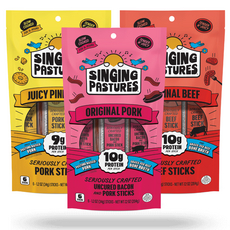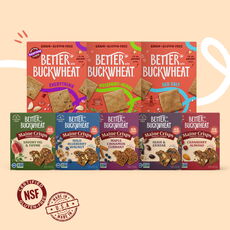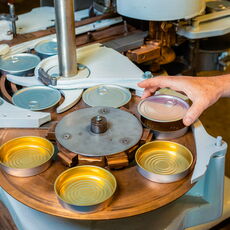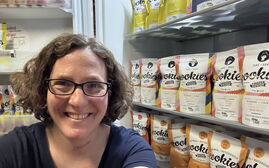
Maine snack attack: Startups aim to take bite out of $173 billion US market
 Photos / Tim Greenway
Matt Chappell, left, and Ben Slayton, co-owners of Harvest Maine.
Photos / Tim Greenway
Matt Chappell, left, and Ben Slayton, co-owners of Harvest Maine.
Tinned fish is all the rage, as 160,000 followers of @tinned_fish_reviews on Instagram can attest.
The account features taste vignettes by a bearded British bloke in a Shriner-style tasseled fez. In one reel, he takes several mouthfuls of Alalunga in salsa verde he likens to “some kind of delicious soup.” He also dives into spicy herring, makes a red mess with Mexican sardines and pits cod liver against monkfish liver in a flavor face-off that’s hilariously offal.
In Maine, the fixation on newfangled snacks is sparking a wave of startups seeking to make their mark in the $173 billion U.S. snacks market. From the canned to the crunchy, many are targeting health-conscious consumers with unusual ingredients, flavors and textures in playful packages that appeal to young adults.

Inside Singing Pastures’ bright, yellow, orange and pink pouches, for example, is a new line of meat sticks hitting the
shelves this month at Renys stores and Hannaford supermarkets. Designed with Gen Z and millennial consumers in mind, the retro-meets-modern bags contain three types of pork and beef sticks. They’re boosted with bone broth and collagen to stand out in the $3 billion meat-stick industry long dominated by Conagra Brands’ Slim Jim’s and other male-focused brands.
“Everyone’s buying meat sticks,” says Holly Arbuckle, CEO of the Newcastle-based business she and her husband, John — a ninth-generation farmer from Illinois — have turned into a $1 million national brand in less than a decade. “Historically women were like, get a granola bar and go to your aerobic exercise. Now it’s like, eat protein and you need to start lifting weights. The whole cultural mindset has shifted.”
In a state known for its agriculture and culinary offerings, Singing Pastures is among startups hungering to shake up healthy snacks. Others include Harvest Maine in Yarmouth and Brunswick, Maine Canned Fish in Topsham and Maine Crisp, a maker of gluten-free crisps and crackers. The grab-and-go boom is also fueling new retail ventures.
‘Snackification’ takes hold
The U.S. snacks market, estimated at $173 billion in 2024, is projected to reach $194 billion by 2030, registering a compound annual growth rate of just over 2%, according to global market research firm MarkNtel Advisors. Researchers attribute the momentum to an evolving lifestyle where consumers are replacing full meals with bite-sized nutrition.
While confectionary accounts for close to a third of the market, increasing interest in better-for-you packaged nibbles is prompting new takes on traditional “junk” foods from Quest’s protein-baked peanut butter cups and tortilla chips to oat milk chocolates by Lindt and Lindor.
Gen Zers are taking snacking to a whole new level, with more than three out of four surveyed by the International Food Information Council in 2022 snacking at least once a day and one out of three doing so twice a day. While hunger or thirst are the main motivators, so are boredom and the need for an energy boost. In another report, Mondelez International — the global conglomerate behind Ritz Crackers and Wheat Thins — found that 96% of global consumers engage in what is known as mindful snacking and 69% look for snacks that are portion-controlled. Also, as people lead busier lives, snacks are increasingly becoming meal substitutes in a trend dubbed “snackification.”
While noshing really took off during the pandemic, the trend continued through 2023’s TikTok “girl-dinner” trend of fast-prep cheese-and-fruit plates. Even mainstream brands are getting in on the action, with cereal giant General Mills Inc. introducing high-protein strawberry and cinnamon Cheerios last December and Mondelez’s new Zero Sugar Oreos expected to hit U.S. grocery store shelves this year, three years after they were introduced in China. But good old-fashioned, protein-rich dairy is growing the fastest, led by Greek yogurt and cottage cheese. One reason for the protein obsession is the influx of weight-loss drugs that have been associated with muscle loss. Now protein comes in an ever-growing number of forms to build back muscle.
$21.B niche poised to grow
With the snacks market getting more crowded, buzzwords on labels can get confusing and downright misleading as federal regulators struggle to keep pace, according to Jason Eastty, a Westborough, Mass.-based nutrition expert and owner of Healthspan Longevity, a provider of wellness services from weight-loss programs to multi-cancer early-detection tests.
“Consumers need to pay attention to the information that companies try to put on labels including added sugars, sodium content and serving sizes,” he says. “The front of package claims ‘all natural’ and ‘made with whole grains’ can be deceptive unless you check the nutrition facts and ingredient list on the back of the package.” Underscoring that ultra-processed foods should be kept to a minimum, he says to “always go for whole foods when possible.”
While that fact is well-documented, even the biggest nutrition nerds are getting in on the snacking craze. That’s fueling a $21.5 billion U.S. healthy snacks niche projected by GrandView Research to grow by 7.5% annually over the next five years, outpacing the broader industry.
Social media is helping spread the popularity, though if tinned fish isn’t your jam, there are also accounts showcasing trending bites from sea-cuterie boards that substitute seafood for salami to no-carb “sandwiches” bookended by juicy watermelon slices in place of bread.
Snack retailers in Maine include Narrative Food, a tiny Deer Isle-based company that has gone through a few iterations since it was founded in 2010 — most recently as a purveyor of corporate food gifts “that tell a story.” Examples include a “Popcorn for Peace Box” to raise money for World Central Kitchen’s crisis relief work.

Founder and CEO Jennifer Piette is a former screenwriter who moved here from California in 2023. Her focus this year is on working with Maine-based companies for a new line of “Build-Your-Own For Good Boxes” showcasing products including 44 North Coffee’s Royal Tar dark roast made with beans sourced from cooperative-owned farm, and “Pears for the People” sourced from Brooklin-based 5 Star Nursery & Orchard, which supports Wabanaki sovereignty through donations to Indigenous-led farms and advocacy for tribal rights.
“Corporate buyers want to tell a great story, but it needs to be a great gift that people are going to enjoy,” Piette says.
Bryna Gootkind, co-founder and CEO of LB Kitchen and LB Mini-Mart in Portland and Westbrook, is equally picky in deciding what to stock in her stores. She says she likes “clean” products with straightforward ingredients and with visually appealing packaging.
Though shelf space is limited, she says that “we would have space for any right brand.”
Spreading out into ‘pummies’
Harvest Maine, a company founded in 2022 by Matt Chappell and artisanal butcher Ben Slayton after Chappell sold Gather restaurant in Yarmouth, offers a new twist on the adage about eating your fruit and vegetables.
Starting with the veg, they created spreads made from produce that was oversized or oddly shaped and not worth farmers taking the time to harvest. Their solution, to reduce organic waste and alleviate some of the costs on farmers was to repurpose unwanted “seconds” into hummus-like spreads. All three — Broccomolé made from Maine broccoli and cauliflower, Beet and Carrot and the slightly spicy Celery Root and Red Pepper — are made with a base of split beans.

More recently, the four-person team branched out into fruit snacks called “pummies” made from a byproduct of cider pressing called “pomace.” Sold in compostable pouches, Apple Pie Fruit Bites and Summer Berry Fruit Bites already account for 40% of sales. As shelf-stable products that don’t require refrigeration, the fruit bites can more easily be shipped over longer distances.
Originally launched in October 2024, the pummies — still made with cider pomace — were relaunched this past April “with a brighter flavor and softer chew” and more suitable to scaling, Chappell says.
While distribution is mainly in Maine, New Hampshire, Vermont and parts of Massachusetts, the company is headed next to Rhode Island, Connecticut and upstate New York, targeting farm stores, natural food markets and regional grocers.
Tweaking the formula
Harvest Maine’s Chappell says that while bringing a new product to market can be long and arduous, he expects revenue to grow by 35% to 50% a year and to eventually add more pummies.
“The market craves innovation, and creativity is the lifeblood of our brand,” he says. His advice to aspiring snack entrepreneurs is to consider a product’s shelf life from the outset.
“Our pummies are shelf stable, but early on we underestimated the importance of shelf life for our refrigerated veggie spreads, and the challenge of moving a cold product,” Chappell says. “Since then, we’ve added natural preservatives and a film-seal step that have tripled our shelf life, but it was a rocky start.”
Singing Pastures in Newcastle has also tweaked its formula with three new products that are lower in calories and higher in protein than its original Roam Sticks. It’s also rebranding the product to highlight the company name that pays homage to the sounds of the domestic and wild animals that live on the farm. It’s located on a former dairy farm in an area of Maine still known to locals still call Cowsh*t Corner.
While the company works with a contract manufacturer in the Midwest because there’s no comparable facility in Maine, Arbuckle doesn’t see that as an obstacle given the brand’s Pine Tree State provenance: “Being a Maine brand carries a lot of weight,” she says. Fresh on the heels of receiving the “Emerging Impact Award” at August’s Newtopia Now trade show in Denver, Arbuckle was getting ready for a “road show” for Costco in Scarborough over Labor Day weekend with an eye on expanding into the northeast region with the discount retailer. Getting into select Whole Foods stores later in the year is also on the radar.

Like Singing Pastures, Winslow-based Maine Crisp aims to stand out from the crowd. The company, staffed by 28 employees, distributes eight products to retailers and wholesalers nationally, according to CEO Lewis Goldstein. It makes three kinds of crackers and five crisps, or crackers made with nuts, seed and fruit.
Goldstein gives much of the credit to the company’s founder, Karen Getz, for creating the crisps more than a decade ago and “for putting all of that info out into the world in a clear, concise and appealing way from packaging to social media.”
The company is ramping up hiring after adding a second shift Sept. 1 as it gears up to launch crips in 100-plus Hannaford stores in coming weeks with its first-ever standalone display known in the biz as a floor shipper. In November, it will launch crisps and crackers in new flavors at some Costco stores in the Northeast.
Canning all the way
Back in the canned-seafood universe, Joshua Scherz is a U.S. Air Force veteran who started Bela Brand Seafood in 1997 to import seafood hand-packed in extra virgin olive oil by canneries in Portugal.

Seeking to revive Maine’s once-thriving canning industry, Scherz has joined forces with former restaurateur Erika Colby to launch Maine Canned Fish later this year. They plan to source and can 100% Maine seafood, including mussels, scallops, oysters, sardines, herring and mackerel. Scherz also aims to team with fishermen interested in canning their own products.
“We are all about creating this community of fishers and canners, and hope we can bring back the industry to what it once was,” he says.
To prepare for the launch, the company participated in the Maine Center for Entrepreneurs’ new accelerator program for consumer packaged goods led by Mark Ozimek, a Portland-based consultant who commends Scherz for building a brand grounded in authenticity.
And who knows, maybe one day on Instagram, the British fish-fluencer will open a container of Maine Canned Fish for grazers around the globe to “ooh and aah” about.















0 Comments